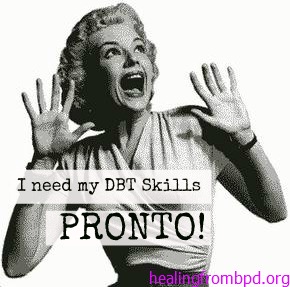On the edge: Group helps families cope with borderline personality disorder
An article regarding family support for BPD…
By Suzanne Wilson
Staff Writer
Published on December 25, 2009
Even when her son was quite young, the woman from the Springfield area said, he often came across as someone with a perennial chip on his shoulder. Though he was a good athlete in high school, disagreements with his coaches would land him on the bench. “His brain doesn’t know when to stop,” she said. “He can’t say, ‘This is stupid.’ ”
Though her son, who is now 39, can be a good, hard worker – he has worked as a landscaper, she said – his behavior has resulted in his going from job to job. He’ll start out thinking a new boss is great, she said, but when something goes wrong, he’ll lash out and then complain about the boss – and the working world in general – with streams of profanity.
Relationships with women he’s dated have ended badly. “He’s now very isolated and alone,” his mother said.
So when she saw a newspaper notice about a meeting in Deerfield for families and friends of those suffering from a condition called borderline personality disorder, she knew she wanted to go. The descriptions sounded all too familiar, she said: the impulsive behavior, the fast-changing moods, the anger, the blaming – and the frustration of a parent trying to understand.
In the same footsteps
When she showed up at the Deerfield Business Center last summer, she was one of six people seated in the conference room. Like several of the others grouped around the table, she wasn’t certain that this mouthful of a term – borderline personality disorder – applied to her son. Her son, she said, has never been officially diagnosed with a mental illness and has always resisted suggestions that he seek counseling.
Bonnie Leena Newcomb, the woman leading the group, introduced herself and offered a disclaimer right off the bat. She was not a therapist or a professor, she said: “I don’t have any initials after my name.”
But as a parent of a daughter in her 20s who has BPD, Newcomb said, she did have something to offer in the way of education, information, compassion and support.
“We walk in the same footsteps,” she said to the others grouped around the conference room table. She knows what it is to have a family member whose moods are unstable, whose relationships with others tend to be chaotic, who is apt to go through intense bouts of anger, depression, anxiety that may last for only a few hours or a day, and whose volatility can make holding a job difficult, if not impossible.
Newcomb, 54, said she was not there to offer “a magic pill” – there is no simple cure – but she has taken training workshops to lead a local affiliate of a New York-based organization that seeks to help families and friends of those with BPD. Newcomb said she also welcomes people who, like the woman from the Springfield area, think their loved ones might have BPD and want to learn more. Over the past couple of years, Newcomb said, she had driven back and forth from the city many times to attend workshops and trainings – “and it was worth every ounce of tired.”
TARA is the short title of the nonprofit organization – its full name is the Treatment and Research Advancements, National Association for Personality Disorder – for which Newcomb is a volunteer. Founded in 1995, TARA seeks to educate people about borderline personality disorder and to help family members and friends of those afflicted with it develop skills that can help defuse tensions when they arise.
Those tensions can arise without a moment’s notice. On its informational Web site, the Mayo Clinic describes having the disorder this way: “You are often in a state of upheaval. Your anger, impulsivity, and frequent mood swings may push others away, even though you yearn for loving relationships. You may idealize someone one moment and then abruptly and dramatically shift to fury and hate over perceived slights or minor misunderstandings. This is because people with the disorder have difficulty accepting gray areas – things are either black or white.”
Emotional upheaval
The federal government’s National Institute of Mental Health estimates that borderline personality disorder affects about 2 percent of the population, though Newcomb says other estimates run higher, to about 6 percent. Even at 2 percent, the NIMH says it affects more people than schizophrenia, a disease that is much better known to the general public. People with BPD, the NIMH Web site says, “may feel unfairly misunderstood or mistreated, bored, empty, with little idea who they are. They may make frantic efforts to avoid being alone. They are often highly sensitive to rejection.”
To the outside world, they can often seem OK, Newcomb said – coming across as bright, funny and smart. But they’re also quick to “escalate,” she said, to become upset or rageful: “They’ve got one foot on the accelerator and the other foot can’t find the brake.”
In desperate efforts to relieve their own intense emotional pain, some people with BPD repeatedly try to injure themselves. Some research suggests nearly 10 percent of people with BPD wind up committing suicide, Newcomb said.
People often confuse BPD with the more widely known bipolar disorder, Newcomb said, but the conditions are different. Someone with bipolar disorder may spend a long period of time in a depressed or manic state, she said, but with BPD, “the frequency of cycling is much faster – it can be minute to minute, hour to hour, day to day.” Further complicating the picture is that the disorder can coexist with a host of other problems, such as bipolar disorder, depression, eating disorders or substance abuse.
As Newcomb told the group that night, the term itself – borderline personality disorder – has been a source of confusion. “These people are not on the borderline of anything,” she said.
By whatever name it’s called, borderline personality disorder is painful not only for those who suffer from it, but for those who are close to them.
“It’s a constant sadness,” said the 66-year-old woman from the Springfield area who had talked about her son in an interview after the meeting.
Incidents that would fall somewhere between annoyance and upset for most people are “massively overwhelming” for him, she said. He once fled the scene of a minor fender-bender he’d caused because, she said, he was so unnerved by what had happened. He tends to see himself as fine and blames others when things go wrong.”
Valerie Porr, the founder and director of TARA, has written that a major reason she started the TARA groups was to support parents who, like herself, were often blamed for their children’s problems. “It seemed we had all been accused of some sort of child abuse,” she wrote in a 1997 essay, “From Grief to Advocacy: A Mother’s Odyssey,” published in the Journal of the California Alliance for the Mentally Ill. “We, the parents, were made to feel like destroyers of those we had brought into the world.”
What causes BPD?
Though not everyone agrees on the answer to that question, many experts today, according to the National Institute for Mental Health and the Mayo Clinic, now say that biology, genetics and life events are all likely to play a role. It’s a brain disorder, Newcomb said, “and stressors can help to tip the scales.” That stress, she said, can be almost anything, from the fast pace of life today, to problems in the home, such as alcohol abuse, emotional abuse or sexual abuse. Recent research, the NIMH says, points to brain mechanisms being involved in BPD, suggesting that people who are predisposed to impulsive aggression have impaired regulation of the neural circuits that modulate emotion.
‘Trailblazing’ treatment
While the medical and scientific research continues, the most urgent question for those affected by BPD, either directly or indirectly, is: How can it be treated?
The easy answer – medication alone – isn’t necessarily the effective one, Newcomb said, in part because BPD’s symptoms can change so rapidly. But treatment options have improved, according to the NIMH, thanks to a treatment called dialectical behavioral therapy that has shown promise in studies.
DBT, as it’s called, was developed several decades ago by Marsha M. Linehan, a psychologist at the University of Washington, and is strongly endorsed by TARA. It is practiced in two ways:
First, as a one-on-one or group therapy used by clinicians who work with BPD, it helps patients regain emotional control and change their behavior. Patients who undergo therapy with DBT-trained therapists learn to identify thoughts and beliefs that derail them, and learn new skills about dealing with others and new skills about calming themselves when they’re upset. Rather than dwelling on the patient’s past, DBT focuses on solving problems in the present. DBT has been in use for many years by clinicians at several mental health agencies in this area, including ServiceNet Inc. Second, trained facilitators like Newcomb teach family members basic interpersonal skills so that outbursts don’t escalate.
Linehan has been “a real trailblazer,” says Ruth Folchman, a psychologist who works for the outpatient behavioral health program at Cooley Dickinson Hospital in Northampton. Though Linehan initially focused on working with patients with borderline personality disorder, Folchman said the techniques she developed can help many people, whether or not they are dealing with mental illness. Folchman is currently using aspects of the DBT model in a support group. Billed as a group for developing “life skills,” its purpose is to help people better manage their lives and relationships by focusing on concrete ways to improve the present.
“It’s like learning a new language” is how Newcomb puts it. DBT has helped her with her daughter, she said: “It takes a long time, but it can help you get from anger and frustration to compassion and empathy. It’s helped me become more consistent. When I stopped being judgmental, we were able to start building trust.”
Suzanne Wilson can be reached at swilson@gazettenet.com.


